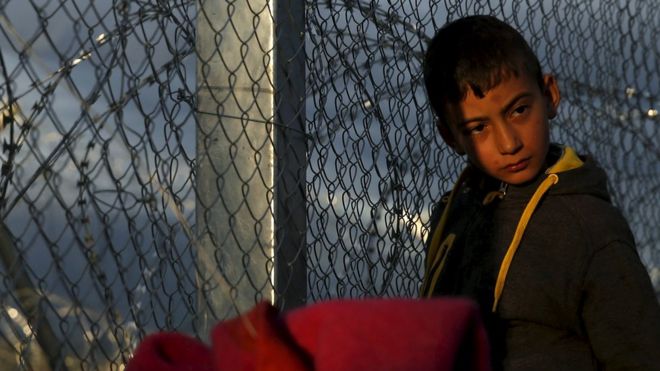Europe's
most senior official for migration has told the BBC that Greece is
"overwhelmed" by new arrivals and that the whole world must react.
At least 2,000 new migrants are registered in Greece every day.But more than 10,000 are stranded on the northern border with Macedonia, as EU countries have re-imposed internal border controls.
Dimitris Avromopoulos, the European Commissioner for Migration, said other states needed to support Greece.
"Greece is overrun, is overwhelmed by all these flows," Mr Avromopoulos, who is Greek, told the BBC.
"We have to mobilise the whole European Union...we must see this situation as a global issue rather than a regional one."
Earlier this week, EU officials announced an aid plan that would allocate €300m (£233m; $325m) this year to help any EU state deal with the migration crisis. In all, €700m would be made available over three years.
Migrant crisis in depth
Have EU promises been kept?
Why is EU struggling with migrants and asylum?
EU migration: Crisis in seven charts
More than 125,000 people have arrived on Greek shores so far this year, close to 12 times more than arrived in the first three months of 2015.
Most are fleeing conflict in Syria, Iraq and Afghanistan and have travelled from Turkey.
Eight countries in the 26-nation passport-free Schengen area have imposed restrictions on their borders, leading to a build-up further south in Greece.
And EU countries who approved a plan to relocate 160,000 asylum seekers from Greece, Italy and Hungary have been slow to do so, with some filing a lawsuit against the plan.
But, he said, there is hope the number of arrivals will soon drop considerably.
Speaking after talks with Turkish President Recep Tayyip Erdogan in Ankara, Mr Tusk said that, for the first time, a "European consensus" was emerging over how to handle the crisis.
Mr Tusk, who is on a diplomatic tour ahead of an EU-Turkey summit on Monday, also said he had been told by Mr Erdogan that Turkey was ready to take back all migrants apprehended in Turkish waters.
On Thursday, Mr Tusk issued a warning to illegal economic migrants not to try to reach Europe,
He also proposed "a fast and large-scale mechanism to ship back irregular migrants" arriving in Greece.
On Friday, Mr Erdogan suggested a new city could be built for migrants in northern Syria, with the support of the international community.
In other developments:
- the number of people seeking asylum in the European Union in 2015 reached 1,255,600, more than double that of the previous year, Eurostat says
- polls have opened in Slovakia, one of the countries that opposes the relocation plan - anti-immigration PM Robert Fico is expected to win a third term
- the EU on Friday has announced the first payments of a €3bn ($3.3bn; £2.3bn) package aimed at helping Turkey cope with migrants on its soil
Among the measures, it says countries must stop the "wave-through" procedure of allowing migrants to move from one country to another, along with support for external border controls, particularly for Greece.
A note on terminology: The BBC uses the term migrant to refer to all people on the move who have yet to complete the legal process of claiming asylum. This group includes people fleeing war-torn countries such as Syria, who are likely to be granted refugee status, as well as people who are seeking jobs and better lives, who governments are likely to rule are economic migrants.

No comments:
Post a Comment